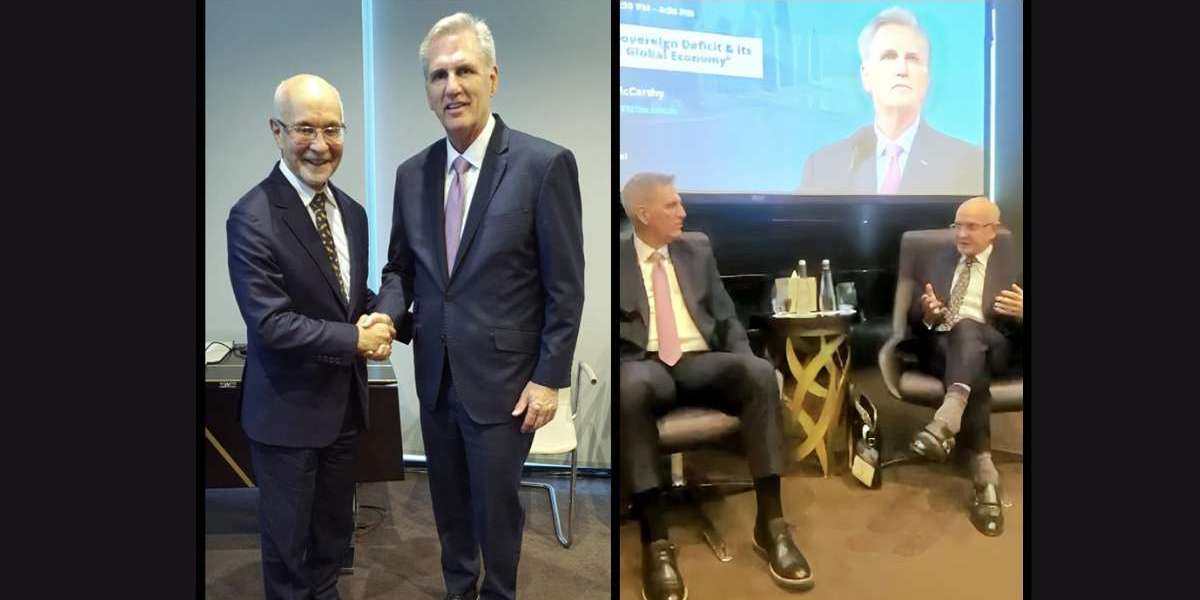
The AIM Summit Dubai 2024 served as a critical platform for global policymakers, economists, and investors to address the world’s evolving financial risks. A major highlight of the summit was the exclusive roundtable discussion between Kevin McCarthy, former Speaker of the U.S. House of Representatives, and David Gibson-Moore, President of Gulf Analytica.
Their powerful conversation explored the Kevin McCarthy sovereign debt discussion, the global sovereign debt crisis analysis, the troubling rise of political polarization in Western democracies, and the growing challenges of economic volatility in emerging markets.
Sovereign Debt: A Global Concern
Kevin McCarthy’s address emphasized how global debt levels have surged to unsustainable levels. Both developed and developing countries now face the harsh reality of mounting deficits, rising interest burdens, and reduced policy space.
According to McCarthy, the U.S. government’s debt trajectory is on a dangerous path, with bipartisan inaction worsening the situation. He called for “courageous fiscal leadership” and Cross-Party Collaboration Initiatives to tackle the root of the crisis. Without serious reforms, the world could be heading into another wave of economic instability.
Global Sovereign Debt Crisis Analysis
David Gibson-Moore offered a macro-level global sovereign debt crisis analysis, explaining how post-pandemic recovery efforts and inflationary pressures have driven up borrowing costs worldwide. Many emerging and frontier markets are now at risk of default due to weakened currencies and dwindling foreign reserves.
The consensus at the AIM Summit was clear: unless countries enforce fiscal discipline and multilateral institutions provide coordinated debt restructuring, the likelihood of sovereign defaults and global contagion will increase.
Political Polarization in Western Democracies
Kevin McCarthy also highlighted a parallel crisis—political polarization in Western democracies. He noted that bipartisan cooperation has eroded, not only in the U.S. but across much of Europe. Governance is now gridlocked by ideological extremism and short-term populist agendas.
This political instability impairs governments' ability to pass essential economic legislation, compounding fiscal challenges. McCarthy stressed that rebuilding trust, restoring institutional credibility, and supporting centrist coalitions is vital for policy progress.
EM-ification of the US Economy
A striking concept discussed during the session was the EM-ification of the US economy—a term suggesting that the U.S. is increasingly mirroring characteristics of emerging markets. These include political volatility, weakened institutions, rising populism, and inconsistent policy execution.
McCarthy acknowledged that while the U.S. still holds unparalleled innovation potential, its internal dysfunctions—if left unchecked—could undermine its global leadership. He urged American policymakers to draw lessons from emerging economies: enforce rule of law, improve transparency, and restore long-term planning.
Emerging Market Trends at AIM Summit
The emerging market trends at AIM Summit reflected a mixture of promise and peril. Many emerging economies are investing heavily in digital infrastructure, green energy, and regional trade cooperation. These trends are reshaping capital flows and opening up new frontiers for growth.
However, the summit also revealed challenges of economic volatility in emerging markets, including exchange rate fluctuations, inflationary pressures, and capital flight. Without robust policy buffers and institutional reform, these countries remain vulnerable to global shocks.
Global Economy and Financial Volatility
McCarthy and Gibson-Moore both agreed that the global economy and financial volatility are now more interconnected than ever. A sovereign debt default in one region can send ripple effects across global markets. They emphasized the importance of early-warning mechanisms, coordinated financial oversight, and proactive risk management strategies.
Investors, meanwhile, were advised to diversify, hedge against geopolitical risks, and monitor policy shifts in both G7 and G20 economies.
US Agricultural Sector and Urban Expansion: An Untapped Strength
While the U.S. faces growing fiscal and political challenges, McCarthy pointed out one underleveraged strength: the US agricultural sector and urban expansion. With abundant natural resources, fertile land, and significant space for infrastructure growth, America holds a unique opportunity to drive economic renewal from the ground up.
This strategy, often used by developing countries, could offer the U.S. a path toward stable growth, especially when coupled with investments in agri-tech and rural revitalization.
Cross-Party Collaboration Initiatives
Perhaps the most urgent recommendation from the session was the need for Cross-Party Collaboration Initiatives. McCarthy stressed that global challenges like sovereign debt, inflation, and technological disruption can only be addressed through unity. Polarized politics must give way to shared vision.
Gibson-Moore added that regional forums like the AIM Summit could play a role in fostering dialogue between diverse political and economic actors—driving innovation, consensus-building, and cooperation.
Conclusion
The Kevin McCarthy and David Gibson-Moore at AIM Summit Dubai discussion was a vital reminder that fiscal discipline, political collaboration, and institutional reform are not just policy ideals—they are necessities for a stable future.
As global economies teeter on the edge of uncertainty, the world must not ignore the warnings from Dubai. Sovereign debt crises, emerging market fragility, and political division threaten the very fabric of global stability. But through dialogue, foresight, and collaboration, there is still time to course-correct.
FAQs
Q1. What is the EM-ification of the U.S. economy?
A: It refers to the U.S. showing signs typical of emerging markets—like political volatility, weakened institutions, and fiscal instability.
Q2. Why is sovereign debt a major concern in 2024?
A: Debt levels have surged globally, and rising interest rates are making it harder for nations to manage repayment without triggering defaults or austerity.
Q3. How can emerging markets manage volatility?
A: By strengthening institutions, diversifying their economies, improving debt transparency, and building foreign exchange reserves.
Q4. What was the key message from Kevin McCarthy at AIM Summit?
A: Fiscal reform and bipartisan collaboration are crucial for addressing the global sovereign debt crisis and political dysfunction.
Q5. How does urban expansion relate to economic growth in the U.S.?
A: By investing in the agricultural sector and infrastructure in underdeveloped areas, the U.S. can stimulate job creation and balanced growth.


